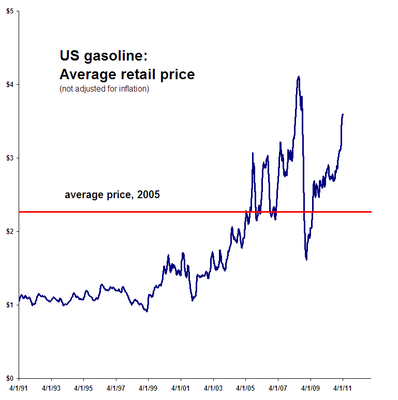President Obama addressed the nation about gasoline prices yesterday, but it’s been almost six years since Americans officially panicked about high prices. It was near the end of September 2005 — a month when average gasoline prices had moved into the high $2 range — that President Bush called for the nation to avoid nonessential driving, and to conserve fuel by carpooling and using transit.
Bush, like many people, blamed the prices on temporary refining losses from Hurricanes Rita and Katrina. So nearly six years on, as summer driving season appears through the windshield, here’s an updated look at what’s happened to gas prices.

With a single brief exception—the immediate aftermath of the 2008 financial meltdown—gas prices have never dipped below average 2005 levels, and they have regularly spiked much higher. As 2011 advances, the trend line is climbing ominously fast, almost as if we’re heading for a repeat of the summer of 2008.
Obama’s speech earned mixed reviews, but he got at least one thing right when he described what we can do to bring prices down: not much. Here’s how he described the 2008 presidential campaign season:
…because we were at the height of political season, you had all kinds of slogans and gimmicks and outraged politicians—they were waving their three-point plans for $2 a gallon gas… And none of it was really going to do anything to solve the problem.
That’s right. Obama’s speech marked a step toward telling Americans the truth that oil companies don’t want us to hear: there’s exceedingly little we can do to change the price of gasoline. It is set, in large measure, by global commodity prices that are mostly out of our control.
That means the only sensible strategy is to insulate ourselves—our families, our businesses, and our governments—from the effects of high prices. We can’t necessarily reduce gas prices, but we can make them irrelevant. Our energy policy should aim to make gas price spikes no more scary than price hikes for typewriter ink or whale oil or draft horses.

Comments are closed.